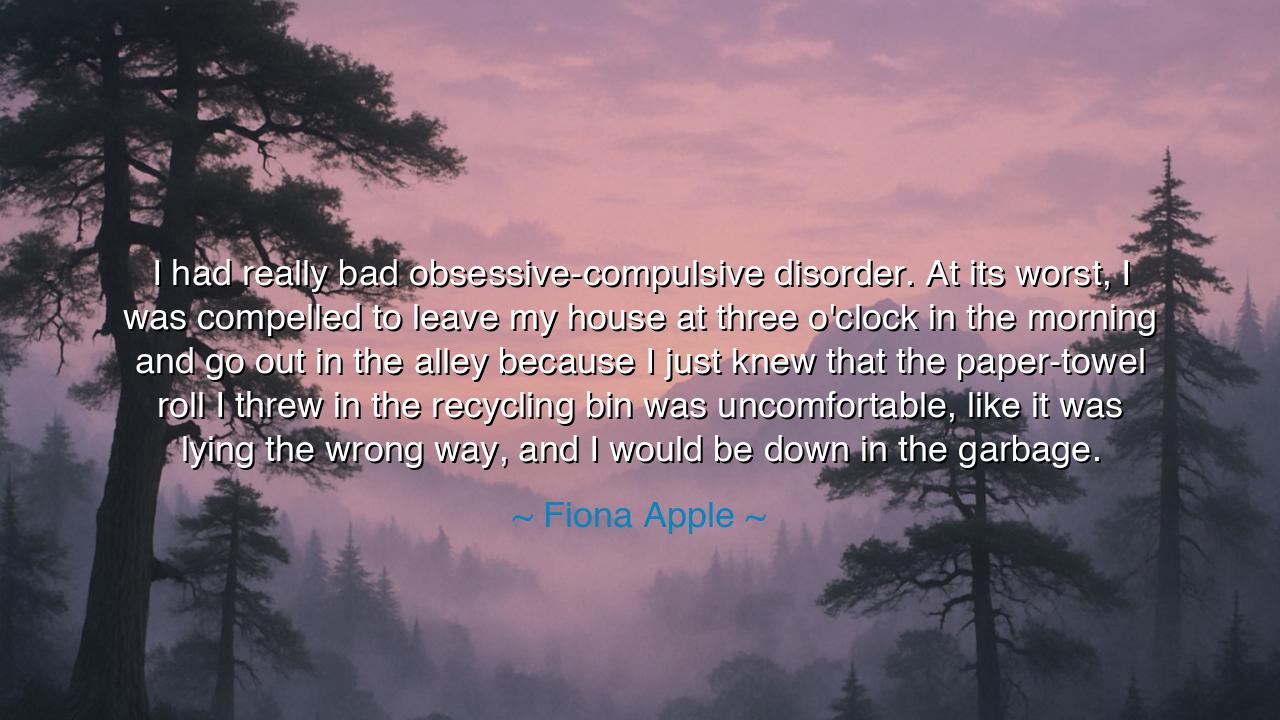
I had really bad obsessive-compulsive disorder. At its worst, I
I had really bad obsessive-compulsive disorder. At its worst, I was compelled to leave my house at three o'clock in the morning and go out in the alley because I just knew that the paper-towel roll I threw in the recycling bin was uncomfortable, like it was lying the wrong way, and I would be down in the garbage.






The words of Fiona Apple, “I had really bad obsessive-compulsive disorder. At its worst, I was compelled to leave my house at three o’clock in the morning and go out in the alley because I just knew that the paper-towel roll I threw in the recycling bin was uncomfortable, like it was lying the wrong way, and I would be down in the garbage,” are not merely the confession of an artist, but the unveiling of the profound struggle between the mind’s prison and the soul’s longing for peace. Here is a vision of OCD not as a quirk or passing unease, but as a tyrant ruling the will, sending its captive into the cold night, demanding allegiance to ritual, no matter how irrational. In these words, she bears witness to the torment of a disorder that chains the heart with invisible bonds.
The origin of such a statement lies in the raw honesty of an artist unafraid to lay bare her pain. Fiona Apple, known for her haunting voice and piercing lyrics, has always been one to give voice to the hidden and unspoken. In revealing her compulsions, she takes what is secret and brings it into the light, offering a testimony for all who know the endless cycle of thought, fear, and ritual. To leave one’s bed at three in the morning—a sacred hour when silence reigns—only to bow to the tyranny of anxiety, is an image both tragic and profound.
This struggle is not new to humankind. The ancients spoke of daimons—spirits that seized men and women, whispering obsessions, driving them toward compulsions that seemed beyond reason. In the life of the philosopher Socrates, there was his “daimonion,” a voice that would forbid him from certain actions. Though he interpreted it as divine, it shows us how deeply the ancients understood the power of an inner force that shapes action against reason. Fiona’s tale is another chapter in this timeless story—the battle between reason and compulsion, between the freedom of the will and the chains of the mind.
Consider also the life of Howard Hughes, the great aviator and industrialist, who in his later years was tormented by compulsions and obsessions. His brilliance could not shield him from the rituals that consumed his life—repeating actions, fearing contamination, unable to rest. Though his wealth and influence were vast, he too was subject to the same prison that Fiona Apple describes: the world narrowed to the tyranny of the mind’s demands. This reminds us that such struggles belong not to the weak, but to all, even the strongest and most gifted.
From such stories arises a deep lesson: compassion. We must learn to see that not all struggles are visible, and that what may look strange or irrational from the outside is, for the sufferer, an overwhelming necessity. To dismiss the compulsions of another as folly is to mock the chains they cannot break. Instead, we must meet such revelations with understanding, and offer the balm of patience, support, and love. For the greatest courage lies not only in fighting battles on the field, but in enduring those fought in the silence of the mind.
Practically, let each of us cultivate both awareness and gentleness. If we ourselves are bound by such struggles, let us remember that naming them, as Fiona did, is the first step toward freedom. If those we love suffer, let us not belittle or scorn, but accompany them, as one would a traveler burdened with a heavy pack. Seek help where it may be found, through healers of the mind, through practices of grounding, through the strength of community. The journey is long, but it is not without hope.
So, beloved listener, take these words to heart. When you hear the story of Fiona Apple venturing into the night to reorder a paper-towel roll, do not laugh, but understand. For within that story lies the eternal truth: the human spirit can endure much, even under the weight of unseen burdens. And if we, with compassion and wisdom, choose to stand by one another in such struggles, then we transform torment into testimony, and despair into a deeper bond of humanity. In this way, the chains of the mind may, slowly but surely, give way to the freedom of the soul.






AAdministratorAdministrator
Welcome, honored guests. Please leave a comment, we will respond soon